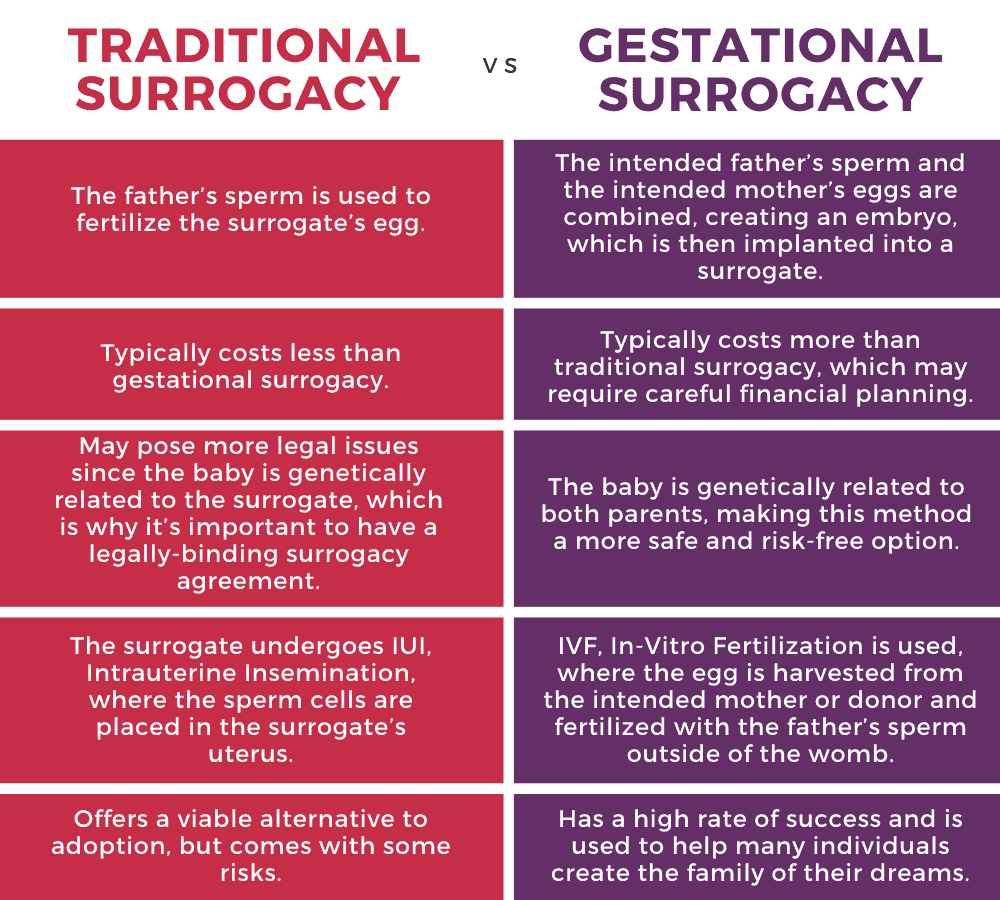Surrogacy is an option for many aspiring parents to fulfill their dreams of growing a family.
As you navigate through your surrogacy journey, it’s important to fully understand your options going into it. That way, you know what to expect and can make an informed decision regarding your family’s future.
The two types of surrogacy are gestational surrogacy and traditional surrogacy. Gestational surrogacy is the more common type of surrogacy in Canada and the United States.
What is Gestational Surrogacy?
In gestational surrogacy, the surrogate is not biologically related to the baby. This means that the intended father’s sperm and the intended mother’s eggs are combined, creating an embryo. This embryo is then implanted in the surrogate, who will carry the baby to full-term.
However, gestational surrogacy is also available using donor sperm or a donor egg, or both — it depends on your medical needs. At ELITE IVF, your fertility team can help you decide what choice is best for you and your family. Usually, gestational surrogacy is useful for women and their partners who are unable to carry the baby to full-term. This may be due to problems with the uterus or a lack of a uterus.
The Pros of Gestational Surrogacy
Many couples prefer the benefits of gestational surrogacy, especially since the baby can be genetically related to one or both parents. Generally, this type of surrogacy has a high success rate as well, which can avoid the pitfalls associated with other fertility options.
Surrogacy also offers a way for you to be as involved as possible given the circumstances. You also have the peace of mind knowing your child is being given a healthy start to life.
The Cons of Gestational Surrogacy
Most surrogacy options come with higher costs than standard fertility treatment, like In Vitro Fertilization (IVF) alone. It takes careful financial planning of the intended parents to successfully follow through with this option. The increased cost reflects the additional involvement of a surrogate in the process of a pregnancy. Her life and expenses during the course of the pregnancy need to be supported and reimbursed by the intended parents.
You will also have to undergo the IVF process prior to surrogacy. Sometimes, this process can take multiple tries. Lastly, you will have to relinquish a sense of control. You must trust in your surrogate that she is setting the stage for your baby to enter the world with the best health possible. The good news is that the team at ELITE IVF will be with you at every step and ensure that all logistics are taken care of so that you can enjoy the journey.
What is Traditional Surrogacy?
Traditional surrogacy involves the use of the father’s sperm to fertilize the surrogate’s egg. This means the child is biologically related to the surrogate. The surrogate carries the baby to full-term. After delivery, the intended parents become the legal guardians of the baby. In some cases, the surrogate will remain unknown to the child and not play a role in his or her life, where in other cases the surrogate and parents may decide to involve the surrogate in the child’s life in some regard. This is discussed, determined and agreed upon by both the intended parents and the surrogate before the pregnancy.
The Pros of Traditional Surrogacy
Typically, this type of surrogacy costs less than gestational surrogacy. This is due to the fact that the IVF process is not necessary. The surrogate does not undergo any in-depth medical procedure besides the injection of the father’s sperm.
This type of surrogacy can also offer a viable alternative to adoption, where one parent is related to the child.
The Cons of Traditional Surrogacy
Traditional surrogacy may pose a difficult situation. The surrogate is biologically related to the child, which can be an additionally emotional process for both the surrogate and the parents.
Traditional surrogacy may also pose legal problems. It’s important in any case of surrogacy that you have a legally-binding surrogacy agreement between the intended parents and the surrogate. Due to the legal ramifications, many aspiring parents choose gestational surrogacy.
Comparing Traditional to Gestational Surrogacy
Making Your Decision: Gestational or Traditional Surrogacy
Medical advancements have made it possible for you to overcome fertility challenges and expand your family. Numerous intended parents choose surrogacy as a way to achieve their family dreams.
Before making a definite decision, you likely need to consider your own health and fertility situation. This may involve various testing beforehand. Also, assessing your finances may further shine some light on what is possible for you and your family. Make sure you have those discussions with your partner. When making your decision, you can further discuss your options with your fertility team. Every person’s fertility experience is unique, and your decision should feel right for you and your partner.
At ELITE IVF, we are here to help you with your gestational surrogacy journey. Our full-service gestational surrogacy program is an “all-inclusive”, and covers all the legal, medical, logistical and financial issues that must go into a surrogacy arrangement. It includes effective communication with all the parties involved such as surrogates, doctors, lawyers, and more. With our compassionate and caring team, you can be confident in making the right choice, as well as receiving a customized and well-rounded experience by letting experienced professionals carry the load of management and coordination for you. Contact ELITE IVF to speak with a surrogacy specialist and learn more about how we can help you grow your family.



